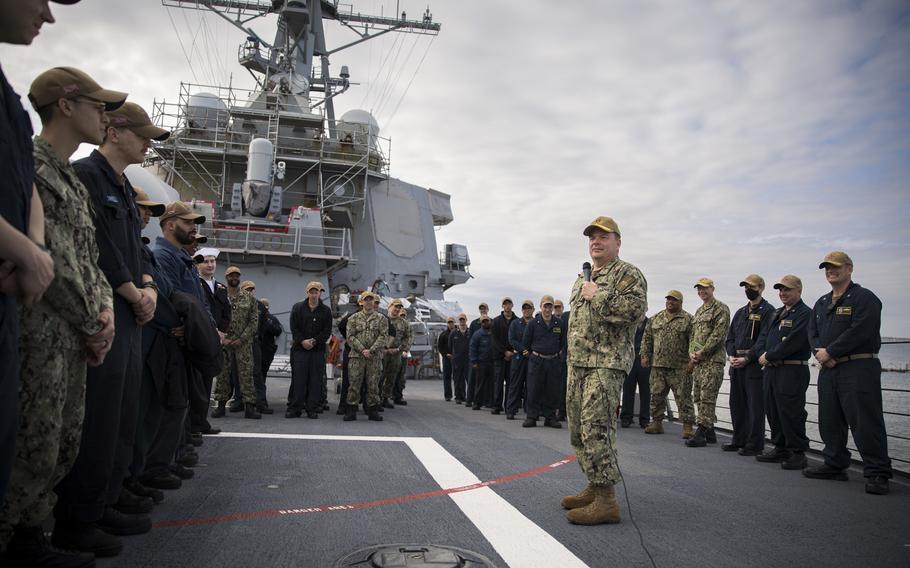
Vice Adm. Rick Cheeseman, chief of naval personnel, speaks to sailors on Feb. 22, 2023, during an all-hands call aboard the guided-missile destroyer USS Stout at Naval Station Norfolk, Va. (Jeanette Mullinax/U.S. Navy)
WASHINGTON — The Navy has halted a staffing change that would have required thousands of recruiters to work an extra day each week — a move that was intended to maximize enlistment efforts as the service faces a shortage of new sailors for 2023.
The Navy’s goal is to sign up almost 38,000 new sailors before the fiscal year ends Sept. 30, but officials expect to miss that target. To get as close as possible, Navy Recruiting Command ordered last week that its recruiters would begin working six-day weeks on July 8.
That change is now on hold.
The office of Vice Adm. Rick Cheeseman, the chief of naval personnel, said he “paused” the plan, which was intended to “extend outreach opportunities to potential recruits,” because the Navy “is committed to providing a work-life balance for our personnel.”
“We will continue to do everything to support our recruiters, adjust policy when we see an opportunity and remain focused on ensuring we have a force ready to fight,” Cheeseman said.
The Navy has close to 4,000 recruiters and the decision forcing them to work an extra day was met by some criticism on social media when it was announced last week. One post from someone who identified as a Navy veteran called it “the most serious misstep I've seen from the Navy in quite some time,” and wrote the move could have “blown up” its relationship with recruiters.
Rear Adm. Alexis Walker, who leads Navy Recruiting Command, informed recruiters of the change in an email that leaked online. In that email, he called the increased workload a “warfighting imperative” because it’s expected the Navy will be as many as 7,000 recruits short of its 2023 target. Adm. Lisa Franchetti, vice chief of naval operations, gave lawmakers roughly the same figure at a House hearing in April.
“The reality is we have a projected shortfall, need a healthy pipeline of people enlisting and need to grow our Delayed Entry Program,” Cheeseman said. “Our recruiters are the people who make that happen.”
The Delayed Entry Program is one that allows recruits to sign up to serve at a future date. During the time between signing up and shipping out to basic training, the recruits can graduate high school, go to college or get various affairs in order. To meet its recruiting target last year, the Navy had to tap into its delayed-entry pool and bring new sailors aboard sooner.
After a similarly difficult recruiting year in 2022, the Navy has explored numerous incentives to attract new sailors. This month, the service said it is offering new members enlistment bonuses as high as $75,000 if they pursue certain nuclear-related jobs. Last year, the Navy announced $115,000 in new enlistment bonuses and student loan repayments. At the time, the service said the incentives were intended to attract the “highest quality of recruits.”
“The quality of recruits joining the fleet is one of our top priorities,” Lt. Cmdr. Richard Parker, a spokesman for Navy Recruiting Command, said Thursday when detailing the temporary change to a longer work week.